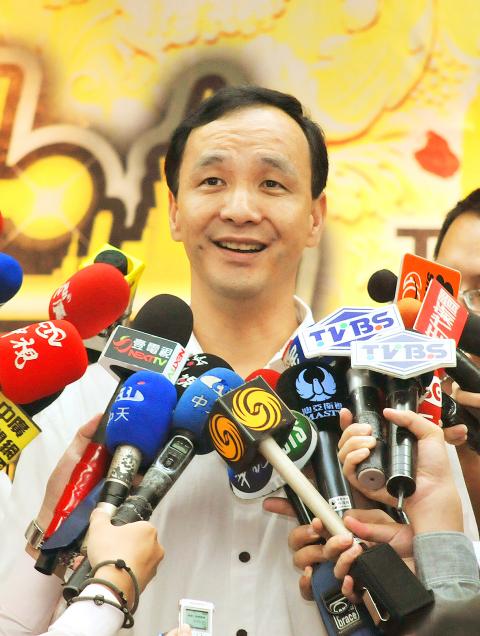Chinese Nationalist Party (KMT) officials yesterday struggled to clarify claims of alleged power struggles within the party revealed by US diplomatic cables recently released by WikiLeaks.
New Taipei City (新北市) Mayor Eric Chu (朱立倫), whose conversations with then-American Institute in Taiwan (AIT) director Stephen Young in 2008 and 2009 on struggles between figures within the KMT has caused a political storm, yesterday again denied making the comments, saying that President Ma Ying-jeou (馬英九) trusted him to be cautious when addressing sensitive issues.
“This is an unexpected disaster, but I will face it with courage ... I believe the content of the cables were the personal interpretations of Stephen Young, which are distorted and inaccurate,” he said yesterday after attending a city cooperation event at Taipei City Hall.

Photo: CNA
According to the cables, Chu, a KMT vice chairman at the time, told Young Ma was not as naive as former KMT chairman Lien Chan (連戰) when handling cross-strait relations, adding that Ma was trying to ease out the party’s “old guard,” including Lien and Legislative Speaker Wang Jin-pyng (王金平).
The cable also said Chu told Young shortly after Ma assumed the presidency in 2008 that Vice President Vincent Siew (蕭萬長) had recommended that then-premier Liu Chao-shuan (劉兆玄) form the Cabinet in order to thwart Straits Exchange Foundation (SEF) Chairman Chiang Pin-kung’s (江丙坤) attempt to take over as premier, the cables said.
In the cables, Chu said that prior to the presidential election in 2008, Wang had invited him to serve as his running mate after a fortunteller told Wang that he would become the party’s presidential nominee because Ma would be forced to withdraw from the race after being indicted on charges of alleged misuse of his special allowance.
Siew yesterday dismissed the content of the leaked cables, saying that as a long-time friend and colleague of more than 30 years, he would never try to ruin Chiang’s chances of serving as premier.
Wang yesterday also denied the claims and dismissed another leaked US cable pertaining to his criticism of Ma.
A cable dated Feb. 14, 2007, said Wang told Young that Ma’s presidential chances “were finished” following his indictment in a special allowance corruption case, and that the KMT would select a new presidential candidate.
While expressing his intention to replace Ma as the party’s presidential nominee, Wang criticized Ma as a “poor and ineffective leader.”
Wang also described Premier Wu Den-yih (吳敦義) as “too corrupt,” and Chiang as too powerless when discussing their presidential chances.
Wu yesterday said it was “impossible” for Wang to make such comments, adding that Young might have misunderstand Wang’s remarks.
“Maybe he heard it wrong because he is a foreigner. Maybe he didn’t hear it clearly,” he said.
Amid the rows sparked by the leaked cables, Chu yesterday dismissed concerns about his political future as a promising star in the KMT and a possible presidential candidate in 2016.
“Everyone [in the KMT] still has confidence in me,” he said.

The manufacture of the remaining 28 M1A2T Abrams tanks Taiwan purchased from the US has recently been completed, and they are expected to be delivered within the next one to two months, a source said yesterday. The Ministry of National Defense is arranging cargo ships to transport the tanks to Taiwan as soon as possible, said the source, who is familiar with the matter. The estimated arrival time ranges from late this month to early next month, the source said. The 28 Abrams tanks make up the third and final batch of a total of 108 tanks, valued at about NT$40.5 billion

Two Taiwanese prosecutors were questioned by Chinese security personnel at their hotel during a trip to China’s Henan Province this month, the Mainland Affairs Council (MAC) said yesterday. The officers had personal information on the prosecutors, including “when they were assigned to their posts, their work locations and job titles,” MAC Deputy Minister and spokesman Liang Wen-chieh (梁文傑) said. On top of asking about their agencies and positions, the officers also questioned the prosecutors about the Cross-Strait Joint Crime-Fighting and Judicial Mutual Assistance Agreement, a pact that serves as the framework for Taiwan-China cooperation on combating crime and providing judicial assistance, Liang

A group from the Taiwanese Designers in Australia association yesterday represented Taiwan at the Midsumma Pride March in Melbourne. The march, held in the St. Kilda suburb, is the city’s largest LGBTQIA+ parade and the flagship event of the annual Midsumma Festival. It attracted more than 45,000 spectators who supported the 400 groups and 10,000 marchers that participated this year, the association said. Taiwanese Designers said they organized a team to march for Taiwan this year, joining politicians, government agencies, professionals and community organizations in showing support for LGBTQIA+ people and diverse communities. As the first country in Asia to legalize same-sex

MOTIVES QUESTIONED The PLA considers Xi’s policies toward Taiwan to be driven by personal considerations rather than military assessment, the Epoch Times reports Chinese President Xi Jinping’s (習近平) latest purge of the Chinese People’s Liberation Army (PLA) leadership might have been prompted by the military’s opposition to plans of invading Taiwan, the Epoch Times said. The Chinese military opposes waging war against Taiwan by a large consensus, putting it at odds with Xi’s vision, the Falun Gong-affiliated daily said in a report on Thursday, citing anonymous sources with insight into the PLA’s inner workings. The opposition is not the opinion of a few generals, but a widely shared view among the PLA cadre, the Epoch Times cited them as saying. “Chinese forces know full well that